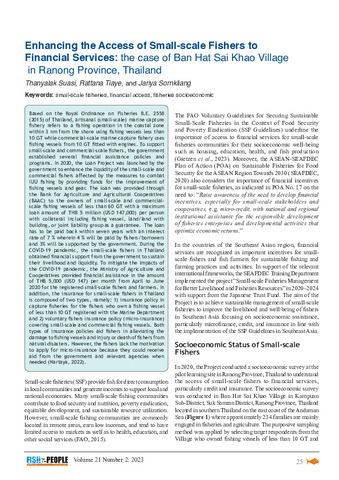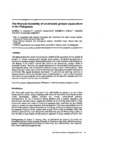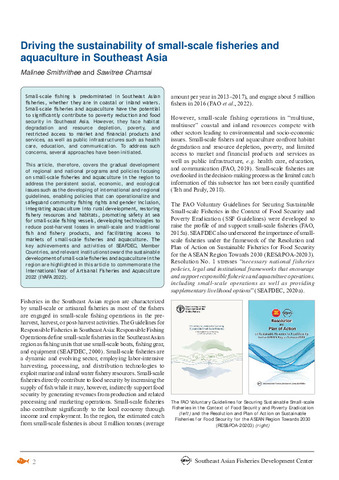Enhancing the access of small-scale fishers to financial services: The case of Ban Hat Sai Khao Village in Ranong Province, Thailand

រកមើល / បើក
Downloads: 78
កាលបរិច្ឆេទ
2023-12Page views
350ទិន្នន័យមេតា
មើលកំណត់ត្រាលម្អិតនៃធាតុ
Share
អរូបី
Based on the Royal Ordinance on Fisheries B.E. 2558 (2015) of Thailand, artisanal (small-scale) marine capture fishery refers to a fishing operation in the coastal zone within 3 nm from the shore using fishing vessels less than 10 GT while commercial-scale marine capture fishery uses fishing vessels from 10 GT fitted with engines. To support small-scale and commercial-scale fishers, the government established several financial assistance policies and programs. In 2020, the Loan Project was launched by the government to enhance the liquidity of the small-scale and commercial fishers affected by the measures to combat IUU fishing by providing funds for the improvement of fishing vessels and gear. The loan was provided through the Bank for Agriculture and Agricultural Cooperatives (BAAC) to the owners of small-scale and commercial scale fishing vessels of less than 60 GT with a maximum loan amount of THB 5 million (USD 147,000) per person with collateral including fishing vessel, land/land with building, or joint liability group as a guarantee. The loan has to be paid back within seven years with an interest rate of 7 % wherein 4 % will be paid by fishers/borrowers and 3% will be supported by the government. During the COVID-19 pandemic, the small-scale fishers in Thailand obtained financial support from the government to sustain their livelihood and liquidity. To mitigate the impacts of the COVID-19 pandemic, the Ministry of Agriculture and Cooperatives provided financial assistance in the amount of THB 5,000 (USD 147) per month from April to June 2020 for the registered small-scale fishers and farmers. In addition, the insurance for small-scale fishers in Thailand is composed of two types, namely: 1) insurance policy in capture fisheries for the fishers who own a fishing vessel of less than 10 GT registered with the Marine Department and 2) voluntary fishers insurance policy (micro-insurance) covering small-scale and commercial fishing vessels. Both types of insurance policies aid fishers in alleviating the damage to fishing vessels and injury or death of fishers from natural disasters. However, the fishers lack the motivation to apply for micro-insurance because they could receive aid from the government and relevant agencies when needed (Nartaya, 2022).
Suggested Citation
Suasi, T., Tiaye, R., & Sornkliang, J. (2023). Enhancing the access of small-scale fishers to financial services: The case of Ban Hat Sai Khao Village in Ranong Province, Thailand. Fish for the People , 21(2), 25-29. http://hdl.handle.net/20.500.12066/7431
ប្រធានបទ
បណ្តុំបណ្តុំ
Related items
Showing items related by title, author, creator and subject.
-
The financial feasibility of small-scale grouper aquaculture in the Philippines
Pomeroy, Robert S.; Agbayani, Renato F.; Duray, Marietta N.; Toledo, Joebert; Quinitio, Gerard (International Association of Aquaculture Economics and Management (IAAEM), 2004)This paper presents the results of an economic analysis of the aquaculture of two species of grouper E. coloides (orange‐spotted grouper, green grouper, red‐spotted grouper) and E. malabaricus (malabar grouper, black‐spotted ... -
Fishing Activities in Relation to Commercial and Small-scale Fisheries in Indonesia
Sumiono, Bambang (Training Department, Southeast Asian Fisheries Development Center, 1997)Presented in this paper is the fishery industry in Indonesia. Given emphases were the fishing gears and fishing fleets that were used for both commercial and small-scale fisheries. Moreover, the detailed design of the ... -
Driving the sustainability of small-scale fisheries and aquaculture in Southeast Asia
Smithrithee, Malinee; Chamsai, Sawitree (Secretariat, Southeast Asian Fisheries Development Center, 2022-12)Small-scale fishing is predominated in Southeast Asian fisheries, whether they are in coastal or inland waters. Small-scale fisheries and aquaculture have the potential to significantly contribute to poverty reduction and ...





